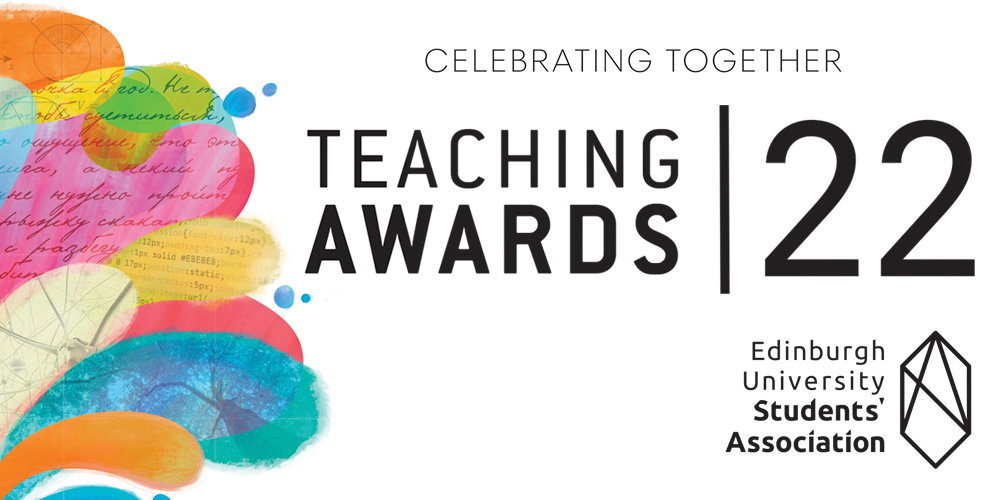In this post, Stuart Lamont takes a closer look at the Teaching Awards category: ‘Outstanding Innovation in Digital Teaching’. Stuart is the Academic Policy Coordinator at Edinburgh University Students’ Association. This post is part of the May-June Hot Topic: Students’ Association Teaching Awards 2022.
The ‘Outstanding Innovation in Digital Teaching’ Teaching Awards category celebrates staff who made excellent use of digital platforms, used technology to engage students as active participants in their learning, and created online spaces for students and staff to come together. Reading the nominations in this category is always a wonderful opportunity to find out about the exciting ways that staff are approaching their practice. These nominations have a lot to teach us about what matters to students and the direction we might be heading with learning technology.
Enhancing the learning experience
Many nominations in this category focused on how teachers adapted their courses to meet learning outcomes during the pandemic. What came through so clearly was that many went beyond providing an equivalent experience and found new learning opportunities in fiercely challenging circumstances. Where there were previously practical restrictions on what students could and could not do, often because of safety or resources, there were plenty of examples of where students were able to go beyond what traditional ‘hands-on’ learning could offer. Writing for Wonkhe, Simone Buitendijk, Vice-Chancellor of the University of Leeds, encapsulated this point:
Immersive technology and simulation make the research and teaching possibilities even more vast. For example, in an online space, a trip into a volcano or an area struck by natural disaster is entirely possible, where it may be far too dangerous or prohibitively expensive in real life.
This came through particularly strongly in nominations coming from the College of Medicine and Veterinary Medicine. Where we would imagine the student experience might most suffer from online delivery, teachers were able to use immersive technology to bring the student right in and take on roles that previously would not be possible. This is what a student described in a nomination for Dr John Ryan in Veterinary Studies:
At first, I thought I would be missing a lot not working in the clinic, but this format actually allowed me to take total responsibility for a “patient” in a way I couldn’t in person…we could perform the surgery instead of just watch from the corner of a surgical theatre…
This potential move toward immersive technology also benefits from student and staff partnership. There were excellent examples of teachers who brought these questions to students, working together to think critically about different options and evaluating strategies for digital learning. Although the nominations are a terrific way to tap into what matters to students, we must be aware that their experiences are varied, complex, and need to be engaged with more broadly across Schools and disciplines.
Enhancing support
Cutting-edge technology and experimental learning were not the sole focus of the nominations in this category. Many students wanted to take the opportunity to thank their teachers and support staff for using everyday online platforms to build community, facilitate academic discussion, and create opportunities for ongoing communication and support. Whether it was Teams forums, WhatsApp groups, Discord servers, or even collaborative spaces on Minecraft, students really appreciated being made to feel supported and part of an engaging community. This element was powerfully described in a nomination for the team behind MSc Epidemiology (Online):
We do not feel that we are studying online with only our own self staying in front of the computer. We feel more connected towards our peers, having more incentives to participate, to involve and to learn.
The nominations which touched on digital innovation had once common thread: deep appreciation for the effort and care teachers put in when adapting their courses through the pandemic. Students recognised those who created engaging learning materials and they made note of the steep learning curve that teachers faced. In a nomination for Norbert Radasci in the School of Engineering, one student noted that his videos “...had backgrounds inserted using green screens and edited to high quality, a process which takes an awful amount of time even for professional videographers…”. It is important to take stock of how far we’ve all come with digital literacy and the hard work it took to get there. The Teaching Awards are one way of doing just that.
Final thoughts
Digital innovation is, of course, about reaching online students as effectively as possible, but its application and future is much broader than that. Students studying in any format can benefit from the potential learning opportunities that innovative technologies can bring. The Teaching Awards nominations provide a glimpse at what the future may be for digital education at Edinburgh. At a time when the University is undergoing curriculum transformation, and we are having these discussions about the future of learning, teaching, and assessment, it’s exciting to see staff at Edinburgh leading the charge in innovation.
 Stuart Lamont
Stuart Lamont
Stuart Lamont (he/him) is the Academic Policy Coordinator at Edinburgh University Students’ Association. He is the staff support for the Vice President of Education, and supports student representatives to engage with academic policy and quality processes. Stuart also leads on postgraduate engagement and data analysis for the Representation & Democracy Team.


